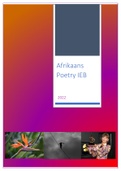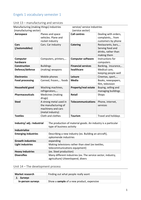Poetry IEB
2022
,Afrikaans Poetry
Contents
Important Terminology ..................................................................................................... 2
Touloper deur Fanie Viljoen ............................................................................................ 3
Vraagteken deur Tanja Joubert ...................................................................................... 7
Strelitzia deur Annie Klopper ........................................................................................10
“Mamma” kan ek nie sê nie deur Jelleke Wierenga ..............................................13
Klien geloof deur Tanja Joubert ...................................................................................16
Sterrekyker deur Franci Greyling ................................................................................19
Daarom deur Ilana Stander............................................................................................22
Die wêreld het so klein geword deur Tanja Joubert ............................................25
Aandeelhouer deur Alta Marincowitz.........................................................................29
Taylor Swift deur Kobus Grobler ................................................................................32
Sondagaande deur Fanie Viljoen ..................................................................................36
Staan op! deur Fanie Viljoen ..........................................................................................38
1|P age
Rachel Jones
, Afrikaans Poetry
Important Terminology
Afrikaans English Meaning
When the same letter, either at the end or
Alliterasie Alliteration
beginning of nearby words are used.
When sounds of nearby words sound the same
Assonansie Assonance
between syllables.
When there is a change in tone, words like “maar”
Wending Change in tone
or “want”, create this change.
Enjambement Enjambement Run on lines.
Alleen plasing Placing alone When one word is placed alone to emphasize it.
Tipografie Typography The layout and printing of the poem.
Versreel A line One line in a poem.
Strofe Stanza A paragraph or stanza in a poem.
The sound of a word that when read resembles the
Klanknabootsing Onomatopoeia
sound that the word describes
Herhaling repetition Repetition of word(s)
When you make a situation seem less serious than
Eufemisme Euphemism
it is (downplaying a situation).
When the words in a sentence are not in the correct
order, therefore not grammatically correct. The
Inversie Inversion
words are ordered like that to create effect or to
rhyme.
Oktaaf Octave 8 lines in a stanza
Sestet Sextet 3 lines in a stanza
Kwatryn Quatrine 4 lines in a stanza
Tersine Tersine 3 lines in a stanza
Koeplet Couplet 2 lines in a stanza
Beklemtoon Emphasizes When a word in a poem stands out
When human qualities are given to inanimate
Personifikasie Personification
objects.
neologism When a new word is formed by combining two
Neologisme
words.
2|P age
Rachel Jones
, Afrikaans Poetry
“Weer” implies that these
Metafoor -The storms that storms of conflict are
the speaker is referring to is Touloper deur Fanie Viljoen reoccurring. (“Weer”
the conflict between him (a impliseer dat hierdie
teenager) and his parents. Alliterasie. konflikstorms herhaaldelik
(daar is konflik tussen die voorkom.)
die storms woed weer in ons huis vandag
spreker en sy ouers)
The storms are raging in our house again today Inversie - Inversion is used to
The rope is a figurative rope, emphasize the word “durf” to
show how brave the teenager is
it’s the path of life. (Dit is ‘n maar vol durf klim ek op die tou (Inversie beklemtoon “durf”, dit
figuurlike tou, die pad wat
wys ons hoe voel moed die
mense in hulle lewens moet
But full of courage I climb up the rope tiener het.)
loop.)
Alliterasie.
Verkliening - it shows how voetjie vir voetjie skuifel ek vorentoe
Shows progression (progressie)
careful these steps are that
he is taking. (Versigtige foot for foot I shuffle forward
bewegings) Metafoor -The speaker is
verby die verwyt-winde van comparing the winds of blame to
those winds that would cause you
to fall off of your rope. (Die
past the reproachful winds of spreker vergelyk die winde van
blameer met winde wat woed
het jy alweer waneer jy op ‘n tou loop.)
did you again
ek het mos gesê These words are in italics to
show that they are the words
that the parents are speaking
I said so (die woorde is in kursief om te
wys dat dit die woorde is wat
Personifikasie – The wat het jy gedoen die ouers praat)
parents look at their
teenager with worry in What did you do “Doer” means far, there are two
their eyes. (Die ouers is reasons the teenager is far, he is
bekommered oor hulle high above the ground on the
gekwelde oë kyk vir my van doer onder
tiener.) rope, and he doesn’t get along
with his parents. (Die tiener is
Tormented eyes look at me from below hoog bo die grond en ver
verwyderd van sy ouers.)
The parents can’t
understand their child’s ver verwyder van my kollig-balanseertruuk
emotions. (Die ouers kan nie “Kollig” is spotlight, the
identifiseer met hulle kind Far removed from my spotlight balancing trick teenager wants attention
nie, hulle is meer gepla oor from his parents. (Die
hulle eie emosies .) tiener soek aandag van
sy ouers.)
3|P age
Rachel Jones
, Afrikaans Poetry
“web” is a spiderweb, the
teenager feels trapped in
my tou web tussen conflict, he can’t escape.
(Die tiener is vas gewang in
Enjambement a web van konflik.)
My rope webs between
mure en deurhandvatsels Walls and door handles trap
A calendar implies that this
fight has been going on for a you within a house, this is
long time. (Die konflik gaan walls and door handles how the speaker feels. (Die
aan vir ‘n lang tyd.) spreker is vas gewang in sy
familiefoto’s en almanakke huis.)
This line could have many
Flashing TV images add to Family photos and calendars meanings: it could be that the
the effect of a storm.
family doesn’t know how to
(“blitsende” pas by die tema
blitsende tv-beelde en internetkonneksies communicate because of
van storms.)
modern technology, it could
mean that the teenager
Flashing TV images and Internet connections
escapes the conflict by
All the conflict ends when the teenager watching TV or going onto the
leaves the garden gate, after that tot by die tuinhek internet, or it could be the
point, he is free. (Waneer die tiener reason for the conflict. (Die
verby die tuinhek is, is hy vry.) up until the garden gate ouers en tiener weet nie hoe
om te kommunikeer nie, Dit
Ironies: you normally don’t kan wees dat die tiener die
ek is hoog bo die grond
feel free in the air. (Jy voel konflik ontsnap deur TV, of
gewoonlik nie veilig hoog bo tegnologie kan die rede wees
I am high and above the ground vir die konlik.)
die grond nie.)
weg van alles behalwe die wind When he is in the air, he is
away from everything except
away from everything except the wind the “wind”, which is a
metaphor for the winds of
Wending blame (r4) (bo die grond is die
maar ek dink nie daaraan nie tiener weg van alees, behalwe
die verwyt-winde (r4).)
The teenager does not but I don't think about it
concentrate on his parent’s winds
of blame, but rather focuses on ek hou my oog op die tou
the rope, which is a metaphor for The teenager is able to
his life. (Die spreker sit al sy take control over his life,
I keep my eye on the rope when blocking out his
aandag op die tou(sy lewe),
eerder as op sy ouers se verwyt- parents’ negativity. (Die
winde.) ek balanseer my lewe spreker is in beheer van sy
lewe waneer hy nie op sy
ouers se verwyt-winde
I balance my life
focus nie .)
4|P age
Rachel Jones
, Afrikaans Poetry
See the difference between Shows progression (progressie)
line 5, and this line. There is en voet vir voet skuif ek vorentoe
no longer verkliening being
used, it shows that the
and foot for foot I move forward
teenager is surer of his
Beklemtoon: There is still
steps, they are not as little as
conflict, but the teenager knows
in the beginning of the deur die storm
how to handle it. (In die lewe is
poem. (Verkliening is nie
daar konflik, maar die tiener
meer gebriuk nie, dit wys dat through the storm weet hoe om dit te behandel)
die tiener seeker is van sy
bewegins).
5|P age
Rachel Jones
, Afrikaans Poetry
Further Analysis
Tone
ⱡ suspense (Gespanne), unrest (onristig)
Title
ⱡ A tightrope walker is someone who walks on a rope high above the ground
carefully balancing themselves with every step. The speaker sees his life as a
balancing act where he must be focused all the time so that he doesn’t fall to
the ground. (A touloper is iemand wat op 'n tou hoog bo die grond loop en
hulself versigtig balanseer met elke tree. Die spreker beskou sy lewe as 'n
balanseertoestand waar hy die hele tyd gefokus moet wees sodat hy nie op die
grond val nie.)
ⱡ The tightrope walker is a metaphor for life, there may be storms in life, but if
you focus on the rope (your own life), you will not fall. (Die touloper is ‘n
metafoor vir die lewe, daar mag storms in die lewe wees, maar as jy op die tou
(jou eie lewe) focus, sal jy nie val nie.)
Structure
ⱡ Vrye vers (free verse)
ⱡ Die spreker is ‘n ek-spreker (first person speaker)
Important notes
ⱡ The word “vorentoe” shows that there is progression, and that the teenager is
moving forward with his life in spite of “storms”. (Die word “vorentoe” wys
dat daar progressie is en dat die tiener vorentoe beweeg met sy lewe ten
spite van “storms”.)
6|P age
Rachel Jones



